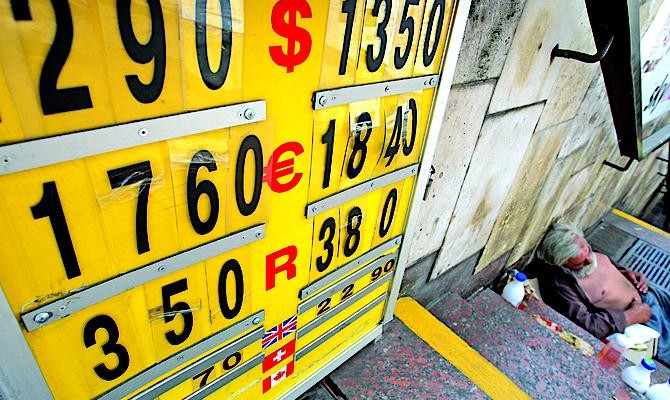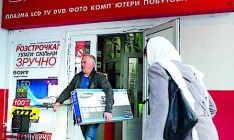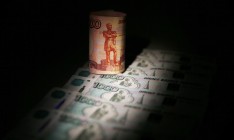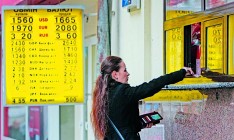Finance
Currency positionDevaluation of the hryvnia is eroding capital in banks

Since the beginning of the year the official exchange rate of the hryvnia versus the U.S. dollar has dropped by 62%. Yesterday it dropped to a historic low of UAH 13.22/US $1.00. The dramatic devaluation has caused problems in the banking system. In the first half of the year banks had to reserve UAH 27.2 bn, accounting for 27% of all costs of financial institutions.
As a result, the overall costs of the sector increased compared to the same period last year by 32.1%. Expenditure growth was primarily caused by devaluation of the hryvnia, which was 47% within the first six months of the year. Assets of banks in hryvnia equivalent are rising, which means banks have to reserve more money for them.
Overhaul
Soaring costs may result in losses and reduction of regulatory capital. «Creation of additional provisions leads to a decrease in capital in case profits are insufficient. Provisions are formed at the from profits and if there is no profit, then through the deduction of capital,» says financial expert Artemiy Yershov. As of July 1 the regulatory capital in all Ukrainian banks amounted to UAH 187 bn, which is UAH 18 bn less than at the beginning of the year. The capital adequacy ratio (H2) in the whole banking system amounted to 15.87%. Early in the year, this figure was 18.26%. «In many banks the reserve adequacy of regulatory capital is quite low, which may lead to a violation of the regulations. As of July 1 the lowest rates were registered at Delta Bank — 10.0%, Privat — 10.9%, Ukrsotsbank — 11.1% and Finance and Credit — 11.84%,» said Director of the Analytical Department at the Ukrainian Credit Rating Agency (UCRA) Andriy Konoplyastiy.
To support operation of financial institutions at least in some way under the current circumstances, shareholders approve decisions to increase capital. For example, in the first five months of this year banks have issued shares to the tune of UAH 2.2 bn. Among banks with the largest amount of emissions in the first half of the year are Delta Bank, Ukrsotsbank, Ukrainian Innovation Bank, National Credit, Credit Dnepr, Prime Bank, Alliance, BM Bank and Platinum Bank.
Taking the short position
The most vulnerable to violations of prudential standards and deterioration of financial results are those banks with the largest amounts of so-called «short position». It is formed when the portfolio of foreign currency deposits in banks exceeds the portfolio of foreign currency loans. The bigger the difference, the more difficult it is for financial institutions to return currency deposits to their depositors, which grow at a faster pace than loans due to devaluation. As of July 1 the highest amount of the short position among the large and major banks were registered in Privat — UAH 8.8 bn, Ukreksimbank — UAH 5.2 bn and Raiffeisen Bank Aval — UAH 4.1 bn.
The short position at Ukrgazbank in the first six months amounted to UAH 1.2 bn. Chairman of the Board of Directors at Ukrgazbank Serhiy Mamedov says that it was formed due to clients’ preferences to make deposits in foreign currency in conditions of hryvnia devaluation. «Basically, a short position is formed in large banks due to the activity of the population and as a result of formation of foreign currency reserves for foreign currency loans,» says Chief Expert of the Department of Operations on Foreign Exchange and Monetary Markets at OTP Bank Nikita Mishakov. He says these factors led to the formation of the short position of UAH 1.8 bn at OTP bank in the first half of the year.
At the same time, lending to individuals in accordance with the requirements of the NBU introduced after the start of the financial crisis is carried out exclusively in the national currency. «A better part of the loans issued to individuals prior to the ban on foreign currency lending has been converted into the national currency. This has also had an impact on the volume of the currency position,» said Mamedov.
Compensate for the risk
Ukrsotsbank (UniCredit Bank) received the lion’s share the short position based on performance results in the first half of the year — UAH 2.4 bn. «In 2009 the National Bank of Ukraine deviated considerably from international standards, excluding reserves of established banks in foreign currency from calculation of an open currency position, the size of which is subject to regulatory limits. Consequently, all banks were forced to significantly increase their short position in foreign currency to fulfill the requirements of the NBU,» said Director of the Market Risks Office at Ukrsotsbank Nadiya Meshenko. The bank tried to compensate for the resulting currency risks by buying to its portfolio the necessary amount of indexed government bonds in 2011 — 2012 and fixed the exchange rate at approximately UAH 8 / US $ 1. Government securities in hard currency were actively acquired also by Raiffeisen Bank Aval.
Bankers also point out that at the end of March there have been positive changes in the regulatory system of the NBU — it adopted a resolution on harmonization of the limits in the open foreign exchange position of the banking system of Ukraine with the international standards. This document will allow banks to redress the imbalance between the calculated open currency position, which is restricted by the limits of the NBU and the actual open currency position, the revaluation of which affects the financial performance results of banks.






 of the agreement of syndication with Financial Times Limited are strictly prohibited. Use of materials which refers to France-Presse, Reuters, Interfax-Ukraine, Ukrainian News, UNIAN agencies is strictly prohibited. Materials marked
of the agreement of syndication with Financial Times Limited are strictly prohibited. Use of materials which refers to France-Presse, Reuters, Interfax-Ukraine, Ukrainian News, UNIAN agencies is strictly prohibited. Materials marked  are published as advertisements.
are published as advertisements.